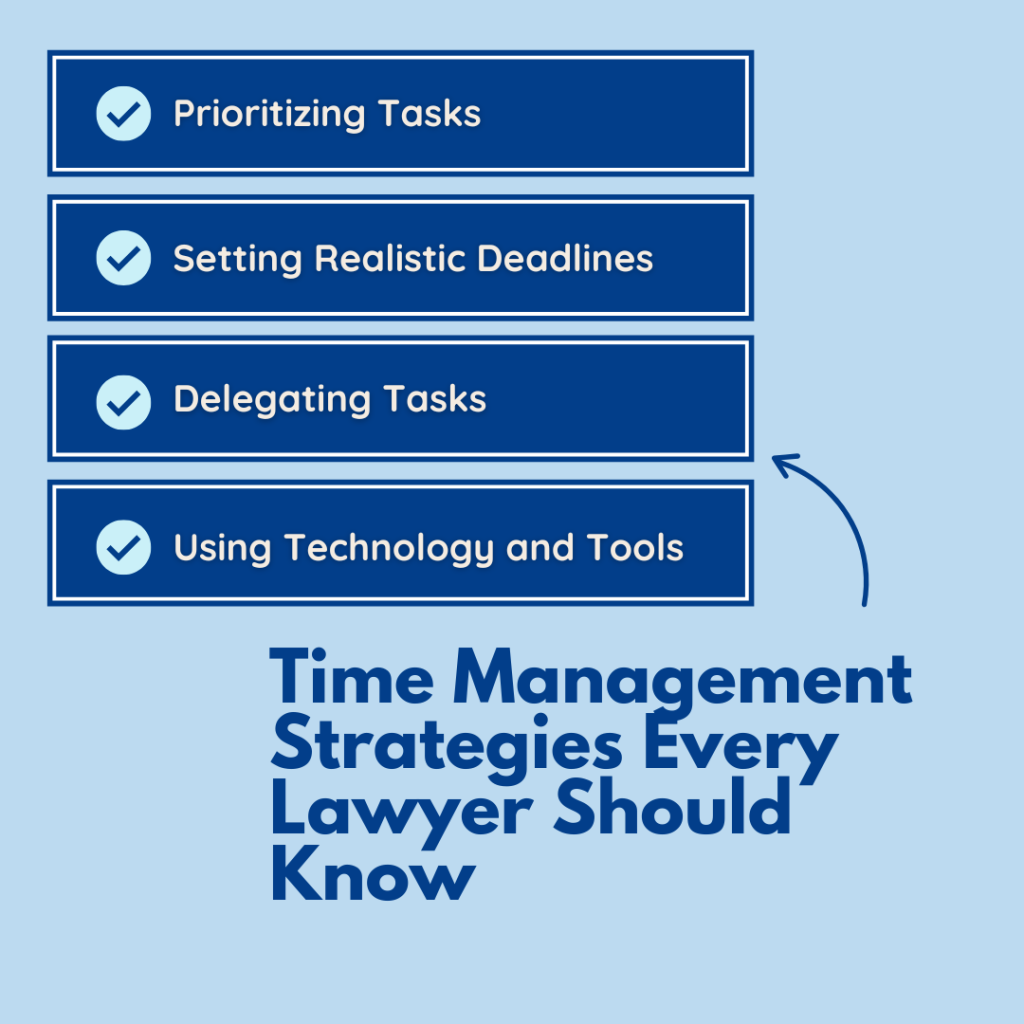
Time is one of the most valuable resources for lawyers. With multiple cases, client meetings, and administrative tasks to juggle, effective time management is crucial for success. Without proper time management, lawyers can easily become overwhelmed, leading to burnout, missed deadlines, and less time for business development. By adopting effective time management strategies for lawyers, you can take control of your workload, reduce stress, and increase your overall productivity.
In this blog, we’ll explore key time management strategies for lawyers that can help improve efficiency, enhance client satisfaction, and ultimately contribute to the success of your legal practice.
Understanding the Challenges Lawyers Face with Time Management
Lawyers often face unique challenges when it comes to managing their time. Some of the most common challenges include:
- Competing Priorities: With numerous clients, cases, and deadlines, lawyers must juggle many responsibilities at once.
- Long Working Hours: Law practices often require long hours, making it difficult to maintain a balanced life.
- Non-billable Hours: Lawyers often spend significant time on non-billable tasks such as meetings, business development, and administrative work, which can be challenging to manage.
- High Expectations: Clients, colleagues, and firms often have high expectations, leaving lawyers with little room for error when it comes to deadlines.
These challenges make it essential for lawyers to develop and maintain strong time management strategies for lawyers that help them stay on top of their responsibilities without burning out.
Time Management Strategies Every Lawyer Should Know

Effective time management strategies for lawyers are essential to streamline workflows and improve productivity. Below are some strategies every lawyer should consider incorporating into their daily routine:
1. Prioritizing Tasks: Learning What’s Urgent and Important
One of the most effective strategies for managing your time is knowing how to prioritize tasks. Not everything on your to-do list is equally urgent or important. Using a tool like the Eisenhower Matrix (which divides tasks into urgent, important, not urgent, and not important categories) can help lawyers identify what needs immediate attention and what can wait.
2. Setting Realistic Deadlines
Lawyers are often given tight deadlines, but setting realistic timelines can help manage expectations and avoid rushing. A good strategy is to break larger tasks into smaller, manageable steps with their own deadlines. This allows you to work systematically without feeling overwhelmed.
3. Delegating Tasks
Many lawyers, especially those in smaller firms or solo practices, try to handle everything themselves. However, delegating tasks is key to managing your time effectively. Whether it’s delegating administrative work to a legal assistant or delegating research tasks to junior lawyers, trust your team and allow them to handle parts of your workload.
4. Using Technology and Tools to Manage Time Effectively
There are countless apps and software designed to help lawyers manage their time more effectively. Tools like time tracking software, calendar apps, and task management tools can help organize your day, track your hours, and stay on top of deadlines. These tools allow you to automate and streamline many of the processes that might otherwise take up a significant amount of time.
How Legal Business Development Impacts Time Management
As a lawyer, part of your daily routine involves legal business development—networking, client meetings, and business outreach. These activities can sometimes take up a large chunk of your time, which can affect your time management strategies. Here’s how to balance business development with managing your practice:
Balancing Billable and Non-Billable Tasks
While billable hours are crucial for generating income, non-billable hours—such as business development and administrative duties—are necessary for long-term growth. Developing a structured schedule that accounts for both billable and non-billable activities can ensure that you don’t neglect either aspect of your practice.
Creating and Sticking to a Structured Schedule for Business Development
Dedicate specific time blocks to business development activities like networking or client outreach. By treating business development as a priority and scheduling it just like client meetings or legal work, you can make progress on your firm’s growth without sacrificing time for your current clients or cases.
Time Management Tips for Law Firm Management
For law firm owners or those in leadership positions, time management is not only about personal efficiency but also about improving the firm’s overall operations. Here are some law firm management strategies to help improve time management:
Streamlining Administrative Processes
Administrative tasks such as billing, client intake, and file management can consume a significant portion of a lawyer’s day. By automating these tasks using software or delegating them to administrative staff, lawyers can free up time to focus on more critical tasks like casework and client meetings.
Delegate and Empower Your Team
Effective law firm management means knowing when to delegate and trust your team with responsibilities. A well-structured team can manage the day-to-day operations, leaving you more time to focus on client-facing tasks or personal development.
Improving Law Firm Efficiency
Implementing efficiency strategies—like using cloud-based document management systems or implementing better communication tools—can drastically reduce time spent on administrative tasks. By creating systems that work for your firm, you can save hours each week that would otherwise be spent on manual work.
Using Time Blocks and Scheduling for Maximum Productivity
One of the most effective time management strategies for lawyers is time-blocking. Time-blocking involves scheduling specific blocks of time for focused work, whether it’s on legal research, drafting documents, or meeting with clients. Here’s why this strategy can be a game-changer for lawyers:
1. Eliminate Distractions
Time-blocking helps you stay focused by limiting distractions. When you set aside specific periods to work on tasks, you can avoid multitasking and dedicate your full attention to one task at a time. This can be especially helpful for lawyers working on complex cases where deep concentration is necessary.
2. Build a Routine
By allocating dedicated time slots for each task, you can develop a consistent routine. Having a structured day helps you make the most of your time and ensures that critical tasks are completed without delay. For example, you might block out mornings for client meetings and afternoons for case preparation.
3. Maximize Productivity
When you commit to a set period of focused work, you often find that you get more done in less time. This strategy prevents procrastination and helps maintain momentum throughout the day.
Overcoming Procrastination and Staying Focused
Procrastination can be a major roadblock to effective time management. As a lawyer, the temptation to delay difficult tasks can be strong, but overcoming procrastination is key to staying on track. Here are a few strategies to help you stay focused:
1. Break Tasks into Smaller Steps
Large, daunting tasks often lead to procrastination. Breaking them down into smaller, more manageable tasks can make them seem less overwhelming. For example, instead of “drafting a client contract,” break it into smaller steps like “research legal language” and “create draft outline.” Tackling small tasks one at a time reduces stress and increases productivity.
2. Set Time Limits for Tasks
Setting a time limit for each task can help you avoid getting bogged down by perfectionism or endless revisions. For instance, set a timer for 30 minutes to work on a draft or review documents. This will help you stay on track without overthinking every detail.
3. Prioritize Self-Care
Sometimes procrastination stems from burnout. Taking regular breaks, exercising, and managing stress are all important for maintaining mental clarity. Incorporate small moments of self-care throughout your day to keep your mind fresh and focused.
Conclusion
Managing time well is one of the most powerful tools a lawyer can have. It reduces stress, boosts productivity, and improves client satisfaction. By setting priorities, using smart tools, and building healthy work habits, lawyers can take control of their schedules and achieve more without burning out.
If you’re looking to improve your time management and overall law practice, personalized coaching can help. Discover practical strategies tailored for your career goals by visiting OnTrac Coach and exploring coaching programs that support lawyers in becoming more organized, effective, and balanced.




